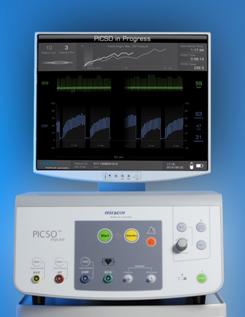
October 8, 2014 — Miracor Medical Systems announced that results from the prospective multicenter safety and feasibility study, ‘Prepare RAMSES,’ were presented at the annual Transcatheter Cardiovascular Therapeutics (TCT) conference last month in Washington, D.C., by co-investigator Tim P. van de Hoef, M.D., fellow of Jan Piek, M.D., Ph.D., principal investigator for the trial at Academic Medical Center, University of Amsterdam.
The ‘Prepare RAMSES’ study evaluated PICSO (pressure-controlled intermittent coronary sinus occlusion) as an adjuvant treatment in patients with acute ST-segment elevation myocardial infarction (STEMI) who were initially treated by primary percutaneous coronary intervention (PCI).
“Optimization of myocardial perfusion after PCI is considered an important therapeutic strategy to limit morbidity and mortality in patients with STEMI,” said van de Hoef. “We were able to confirm the safety of PICSO application in these patients, which is an important milestone toward addressing this large unmet clinical need.”
A secondary objective of the clinical study was to explore the magnitude of effect of PICSO on myocardial function and infarct size by magnetic resonance imaging (MRI) and compared with a historical control group. The study was able to demonstrate that successful administration of PICSO therapy was associated with up to 50 percent significantly greater myocardial recovery during four months follow-up when compared to the matched historical control patients.
“Myocardial perfusion remains impaired in up to 40 percent of patients with STEMI even after primary PCI, and this prevalence is associated with adverse clinical outcomes,” said Piek. “The clinical study showed that PICSO may significantly reduce infarct size and augment myocardial recovery after primary PCI in a dose-dependent manner.”
“The reduction of infarct size after myocardial infarction is a significant unmet clinical need and requires new therapeutic options for my daily clinical practice. I believe that U.S. cardiologists would embrace the PICSO technology as an adjunct to primary PCI,” said Thomas C. Piemonte, M.D., Lahey Hospital & Medical Center in Burlington, Mass.
The ‘Prepare RAMSES’ study additionally provided important user feedback that enabled Miracor to introduce a second-generation product portfolio and to redefine PICSO therapy based on the clinical results, allowing for patient treatment without significant prolongation of use of the cath lab, an important economic aspect of the PICSO Impulse system.
“The study results further encourage us in our efforts to reduce the negative long-term consequences of impaired cardiac function in patients after myocardial infarction,” said Ludwig Gold, CEO of Miracor Medical Systems. “Miracor has meanwhile made significant investments and recently launched the next generation of the PICSO Impulse system with substantial improvements to both the PICSO Impulse catheter and the PICSO Impulse console. We are now also able to more precisely define the necessary therapy and procedure to achieve significant clinical results. Successful usage in the United Kingdom and Hungary has shown significantly improved handling and stability of the systems, which will further increase the performance of the PICSO Impulse system.”
The Miracor PICSO Impulse system is designed to treat acute STEMI patients and less severe non-STEMI patients by improving myocardial perfusion in complement with PCI. The system is approved for sale in Europe; it is not approved for use in the United States.
For more information: www.miracormedical.com


 January 05, 2026
January 05, 2026 









